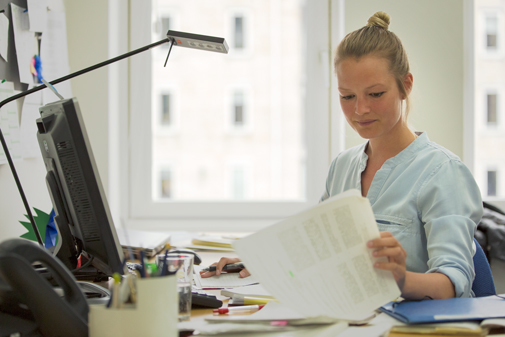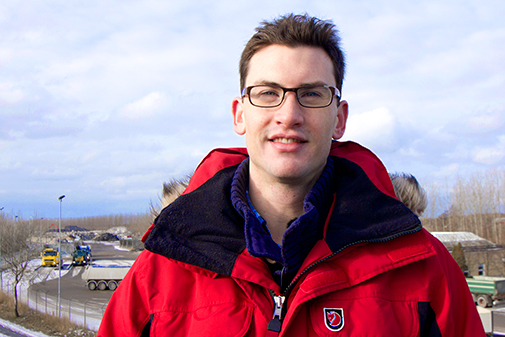Testimonials
Read interviews with a graduate and an international student from the MSc programme in Environmental Science:
Maiken Guldborg Rasmussen landed her dream job at the Danish Environmental Protection Agency just six months after completing her MSc in Environmental Science. In her daily work, she constantly uses the programme’s broad academic foundation, as well as her own focus on toxicology.

What prompted you to study Environmental Science?
My main interests are human biology and human toxicology. Early along in my bachelor’s programme in biology, I knew that I would work in this area. So, I steered my optional coursework towards those interests.
When the time came to select a graduate programme, I was convinced that the Environmental Science programme was the best in Denmark for becoming a trained toxicologist – due to its coursework in toxicology, epidemiology and risk assessment.
So, you were able to gear the programme towards your own interest in human toxicology?
Yes, each course had an element related to human health, one that we connected to environmental chemistry.
For example, in the Air Pollution and Health course. In it, we first learned about the chemistry of air pollution, and then, for example, connected that knowledge with how nanoparticles and aerosols enter respiratory passageways and inflict harm. So, there was always a human toxicology angle, even in the more hard-core environmental chemistry subject matter.
Today you work at the Danish Environmental Protection Agency. What is your work about?
I work in a subsection of the Chemicals Unit (link to the agency's web portal), called the Consumer Group. Among other things, our job is to map: the presence of specific chemical substances in various consumer goods, how much we are exposed to them, and if there is a health or environmental risk associated with exposure.
For example, we have focused on biocides (fungal and insect killing substances) found in textiles. When clothing is imported, from Asia for example, some manufacturers add biocides to clothes so as to protect them against fungi during their shipment in containers.
Biocides must be approved before they are used on textiles in the EU, but it is uncertain if non-EU countries follow EU regulations in this area. This can be a problem because some biocides are carcinogenic or hazardous to the environment. So, we investigate if biocide residues are present in textiles and if they can be washed out – and if not, how much are we being exposed to? Thereafter, we conduct a risk assessment.
The areas that I am responsible for include perflouride compounds, phtalates and CMR substances (carcinogenic, mutagenic and reproductively toxic substances) in toys. Because we are a government ministry, our work priorities are generally guided by political decisions and agendas.
Another aspect of my work is to develop informational campaigns. Among these, we had a campaign to inform pregnant women about the dangers of certain chemicals to foetal health and development. Another one, ”Think before you ink”, focused on tattoo inks. Because this is an unregulated area, consumers need to consider what substances are being used for their tattoos. For example, some can be allergens.
If I am involved in manufacturing safety, I also have to participate in EU-level groups. Here, we meet 4-5 times a year in Brussels to discuss what we can do to protect consumers as much as possible, together with our international colleagues. This may lead to the regulation of a chemical, for example.
So your job entails a bit of travel?
Yeah, a lot. I had only been here for one month when the first trip came up. So they place confidence in the abilities that we arrive with, and that we are able to represent Danish positions.
Do you think the programme prepared you well for this particular job?
Yes. In fact, I think I come from a really good educational background in relation to the area of toxicology that my group deals with. I can really sense that being from the Environmental Science programme is a strength.
I am also trained in epidemiology, which is really important for understanding how researchers conduct the types of studies we use in our work.
For example, heading into the lab and testing a chemical on a test animal isn’t always possible. And, you can’t just expose humans to a chemical and see whether or not they suffer harm. In these instances, one needs to know how to use cohort studies (studies that track a specific group of people for an extended period of time), for example. And that’s something we learned how to do in the course Environmental Epidemiology.
What was the subject for your thesis?
I wrote about reproductive toxicology. Specifically, it was about bisphenol A, and its effect on semen quality and brain development.
I wrote the thesis together with some researchers at DTU Food. The thesis was a research project: I first constructed a hypothesis and outlined goals for what we wanted out of the research, and then concluded with a definitive risk assessment based on the study.
I began by looking at how studies in this area had been conducted. Thereafter, we conducted a laboratory study, during which we exposed rats to bisphenol A before, during and after pregnancy, and examined their brains, behaviour and the semen quality of their offspring. The thesis work has been extremely helpful in my current job, because I understand the entire research process.
What should someone be especially interested in if they want to study Environmental Science?
If one has a general interest for the effect that chemicals can have on humans or the environment, then the programme is pretty much a direct hit. And, of course, it is chemistry. So, that should also be of interest.
Some of the people I studied with were really interested in agriculture and foodstuffs, and the types of chemistry involved there – like pesticides and how they break down in soil. So, in a way, the programme is quite broad.
If you had to summarise, what was the best thing about studying Environmental Science?
I think that the programme’s breadth is a clear advantage – one gains knowledge of humans, and about air, water and land pollution.
In my current job at the Danish Ministry of the Environment, it is an advantage to not have a pure biology or chemistry background, because we work with a blend of chemistry and biology. One typically doesn’t end up as a researcher in a narrow field of research, or addressing the effect of one chemical in a particular aquatic environment. Instead, one usually works with things as a whole, which makes it really advantageous to have an interdisciplinary background like the one offered by Environmental Science.
So, I guess you are happy about your job?
Yes, very! It’s a bit of a dream scenario. I didn’t expect to get the job that I had hoped for most, just a half-year beyond graduation. But now I am doing precisely what captivates me, doing what I find super interesting.
Australian Olivier Clarke is one of the international students doing a Master’s programme in Environmental Science at the University of Copenhagen. "The Danes have a lot of knowledge of environmental pollution", says Olivier, who wants to "take this knowledge back to Australia and try to implement it there".

Why did you choose this programme?
I chose this programme because I have a very strong interest in the environment and because I have a background in biology from my education in Australia. So I thought it was a very nice way to combine those two aspects to come out with some more specialized knowledge.
There is a lot of knowledge up here in Denmark and Scandinavia. I have taken the education so I can take some of this knowledge, and try and bring some of that back to Australia to improve the way things are done there.
I think it is important to study Environmental Science because we are releasing a lot of chemicals into the environment. It’s very important to understand where the chemicals go and the effects they have so that we can deal with these and develop better chemicals, so we don’t keep magnifying the problems we are making.
Are you satisfied with the programme so far?
The Danes have a lot of knowledge of environmental pollution and the effect of chemicals in the environment. We learn about the problems with polluted soil and how to clean that soil up and be able to use it again.
I definitely consider this an international programme because we have a lot of different groups who study things all over the world. Like for example for my Master’s programme I went to eastern Greenland and got samples from animals that have been killed by Inuit hunters. Now I’m analysing those for hormones and pesticides and organic pollutions.
I think the excursions are a very important part of the education, because they really show how the things we learn in the classroom are actually applied and how it works in the real world.
How’s your experience of studying in Denmark?
Studying here has been a really great experience because I have been able to learn a lot about protecting the environment and also to put in into practise a little bit with the society and culture here.
The University of Copenhagen is a good place to study because there’s a lot of resources available to students. The teaching style here is very intimate and relaxed which I think is really nice.
As a student it is very easy to approach your teachers. It’s quite an informal relationship - it makes it easier to ask questions and get feedback. In general there is a mutual respect between students and teachers.
Do you like the city?
Copenhagen is a really nice city. I think it has a really good size. It’s relatively quiet, compact and I really like the cycling culture here. To me that is a really big plus and you can ride almost anywhere within 15-20 minutes. That is a big advantage.
I like rock climbing. There is quite a lot of possibilities for indoor climbing in Copenhagen and I’m making trips to Sweden when I want to climb some real rock. I have also been doing some sea kiting here in the summertime and have been hanging out in the parks, biking, and socializing and things. Everybody here is biking, so if you are coming to Copenhagen my advice is to get a bike as soon as you can! It’s a great city and I really recommend it.
